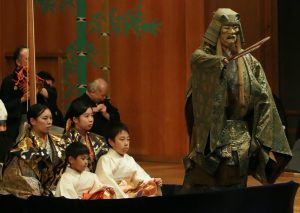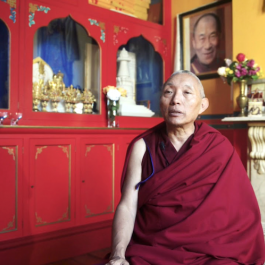
The prominent Buddhist social activist Rani Yan Yan, who campaigns for Indigenous human rights and women’s rights in the Chittagong Hill Tracts region of Bangladesh, was among six social activists recognized in Washington, DC, at the First Annual Ceremony for the Secretary of State’s Award for Global Anti-Racism Champions on Wednesday, coinciding with the International Day of the World’s Indigenous Peoples.
Rani Yan Yan is a prominent social activist who campaigns for indigenous human rights and women’s rights, in particular for her ethnic community in the Chittagong Hill Tracts region of Bangladesh. A leader of the predominantly Buddhist Chakma and Marma communities—the largest and second-largest, respectively, of 11 ethnic groups in the Chittagong Hill Tracts—the majority of whom practice Theravada Buddhism, Yan Yan’s work has garnered international attention for the struggles of her community and violence committed against minority groups in Bangladesh—sometimes at great personal risk.
“As a leader from the Chakma Circle,* Yan Yan actively advocates for vulnerable populations facing government-sponsored discrimination, land grabbing, violence, and the adverse effects of climate change,” US Department of State said. “As a direct result of Yan Yan’s activism, the international community has gained new awareness of the violence committed against indigenous peoples’ communities and minority groups in Bangladesh. Throughout her career, Yan Yan has advised domestic and international organizations on climate resiliency and gender equality, researched the political participation of indigenous women, and mentored youth activists on diversity and social inclusion. Yan Yan has emerged as a fearless voice and outspoken advocate for equal rights and justice, despite facing immense discrimination and even violence.” (US Department of State)
The Global Anti-Racism Champions Award is an international award honoring individuals from civil society who have demonstrated exceptional courage, strength, and leadership in working to advance the rights of people from marginalized racial, ethnic, and indigenous communities. Awardees are selected from outstanding civil society leaders and activists who are nominated by US embassies and consulates around the world.
“Seventy-five years ago, nations around the world adopted the Universal Declaration of Human Rights, affirming that every human being is born free and equal in dignity and in rights. That meant, and it still means, people of all races and all ethnicities, US Secretary of State Antony Blinken noted in his address for the inaugural award ceremony yesterday. “Yet we all know that for far too many individuals, there continue to be challenges when their fundamental rights are violated or denied because of their race or ethnicity. Some are beaten and harassed, shut out of jobs, denied education. Some bear the brunt of crises like climate change and epidemics yet are often excluded from decisions about the very issues that affect them the most and deprived of the support that they need to shoulder the impact. . . .
“If entire communities are denied opportunity, that holds back an entire nation’s economic potential. When certain groups can’t access vaccines and treatment, that hinders our ability to prevent, to detect, to respond to global pandemics. When individuals don’t see themselves reflected in the governments that are purported to represent them, that undermines faith in the system and in our democracies. In other words, racism, discrimination—these are not only morally wrong; they make our world less safe, less stable, less prosperous. . . .” (US Department of State)
In addition to her fearless Indigenous rights advocacy, Yan Yan, a practicing Buddhist who has previously been ordained as a female monastic, was a finalist for the Women Building Peace Award of the United States Institute of Peace for her efforts to empower Indigenous women and promote peace in the Chittagong Hill Tracts. She is an alumni of the Diplomacy Training Program at The University of New South Wales, and the Asia Pacific Forum on Women, Law and Development’s Feminist Legal Theory and Practice graduate.

Following is an excerpt from Yan Yan’s address at Wednesday’s award ceremony in Washington, DC:
I’m both honored by this recognition and humbled to receive this award on the International Day of the World’s Indigenous People. On this day, we celebrate the diversity of peoples. We recognize continuous marginalization and racial discrimination against Indigenous peoples within their nation states. And we aim to promote and protect rights of Indigenous peoples.
Distinguished guests, militarization of our territory; state-sponsored settlement of hundreds and thousands of non-Indigenous peoples on our land; ongoing land-grabbing by politically backed individuals, entities, and security forces; arson and community communal attack, impunity for perpetrators of violence against Indigenous women and girls; and criminalization of rights defenders are just a few examples that are eerily similar to what Indigenous and racially marginalized communities are facing elsewhere in the world.
In this context, my work as an Indigenous human rights defender has focused on raising awareness [of the] systematic marginalization of Indigenous peoples, facilitating network- and alliance-building among communities and organizations, and mobilizing Indigenous communities to defend their right to land. I have seen and experienced firsthand how intersecting identities pave a way to further marginalize Indigenous women.
This is precisely why a significant portion of my work is dedicated to empowering Indigenous women—more specifically, rural Indigenous women—in becoming agents of change, worthy leaders, and protectors of our rights. We have been able to initiate appointments of women village chiefs in a male-only traditional system, thanks to the chief of Chakma Circle, Raja Devasish Roy, to whom I am adviser. And the number is ever increasing since the inception eight years ago, as are the contributions from these Indigenous women leaders.
Once I was a youth, full of aspirations, new ideas, hopes, and dreams of a better and just world. And now, 10 years later, I’m older but no different than the self I had. But very few youths in our Indigenous communities were and still are as fortunate as I have been. Lack of opportunities, crisis of leadership, and denial of accessing spaces to voice their opinions have created a despair among these youths, despite—despite—having full potential to contribute toward or even to lead this movement against racial discrimination. Creating enabling environments for these youths, bridging generation gaps between the elders and the youth, and building solidarity and facilitating collaboration among youths from different ethnicities have been my priority since my early days as a rights defender.
Esteemed guests, the global scourge of racism and xenophobia cannot be eradicated instantly, neither can we hope for a just world in a given number of years. This endeavor is a continuous work in progress that my fellow awardees understand too well. To move forward, however, we need to ensure that rule of law prevails in our countries within open and democratic governments that are accountable to citizens. And within ever-shrinking civic spaces in many countries, activists are dealing with impact of curbed freedom of speech and freedom of press that reduces our ability to communicate and to amplify awareness on these pressing issues. So this Global Anti-Racism Champions Award is significant in that aspect, as it is amplifying each of our voices and will be integral in increasing our visibility of our unique but interconnected struggles to achieve racial equity and justice.
And on that note, before I end my speech, I would like to assert that no one—and absolutely no one—can become a champion without [the] efforts of countless others and without their support, small or grand. To me, this award is not a testament of my achievement, it is a recognition of our collective effort, our achievements. Hence, I’m dedicating this award to all my fellow human right defenders—the elders and the youths alike—and rural Indigenous villagers from Bangladesh, the most genuine, the most resilient people I’ve been ever fortunate to work with, to interact with, who have supported me through and through.
Ladies and gentlemen, claiming rights as a person from racially discriminated communities is challenging, but claiming rights as a woman from those communities poses heightened challenges, which I, like other human – women human rights defenders around the world, are constantly trying to overcome. The path to justice is never meant to be easy, and efforts are made to silence our voices over and over again. Yet, I’m here, we are here standing our ground, and we are determined to strengthen and uplift the next generation of leaders and champions in solidarity with everyone around the world who are fighting against racial discrimination and structural injustices to build a better and a just world for all.
Thank you all.
Buddhism is a minority religion in Bangladesh, practiced by just 0.61 per cent of the population, according to census data for 2022. Muslims make up 91.04 per cent of the population, Hindus constitute 7.95 per cent, Christians 0.3 per cent, and others 0.12 per cent.
The majority of the 11 ethnic groups in the Chittagong Hill Tracts practice Theravada Buddhism. The region has been plagued by conflict and oppression for decades, amid tensions with Bangladesh’s Muslim-majority population, and with minority communities reporting widespread persecution by the government and security forces stationed there.
“In 2018, while translating for two Indigenous teenagers who had been sexually assaulted by security forces, police violently attacked [Rani Yan Yan].”** Blinken observed. “If they hoped to discourage her advocacy, they failed. Just two months after the attack, Rani Yan Yan participated in the UN Permanent Forum on Indigenous Issues, showing her own personal indomitable courage. She said, and I quote: ‘Since I have the means and the capacity to amplify the voices being left unheard, I think I need to act on it. I am simply fulfilling my responsibilities as a citizen.’ What an incredibly powerful message to all of us.” (US Department of State)

Yan Yan is one of six recipients of the 2023 Global Anti-Racism Champions Award. Her fellow awardees are:
• Kari Guajajara, an Indigenous leader from the Brazilian Amazon who works as a legal advisor for Indigenous representative organizations, promoting Indigenous Peoples’ rights, combating gender-based violence, and protecting the environment.
• Oswaldo Bilbao Lobatón, an Afro-Peruvian activist who has spent more than 40 years fighting for the recognition and rights for Afro-Peruvians, one of Peru’s least visible and most disadvantaged populations.
• Saadia Mosbah, a Tunisian activist who has dedicated her life to fighting racial discrimination and prejudice, as well as defending the rights of Black Tunisians.
• Sarswati Nepali, a social activist in Nepal, president of the Dalit Society Development Forum, and a defender of the human rights of marginalized castes, the disabled, and the poor.
• Victorina Luca, a human rights lawyer and founder of the Roma Awareness Foundation, and a champion of racial equity in Moldova for more than 15 years.
* One of three hereditary chiefdoms in the Chittagong Hill Tracts.
** Protestors Rally in Bangladesh Over Alleged Sexual Assault of Sisters from Minority Buddhist Community (BDG) and Tensions Rise in Bangladesh After Alleged Sexual Assault of Two Sisters from Buddhist Minority Community (BDG)
See more
2023 Global Anti-Racism Champions Award (US Department of State)
Secretary of State’s Award for Global Anti-Racism Champions (US Department of State)
Secretary Antony J. Blinken At the First Annual Ceremony for the Secretary of State’s Award for Global Anti-Racism Champions (US Department of State)
Related news reports from BDG
Hindu Buddhist Christian Unity Council Seeks Greater Representation in Bangladesh
Ramu Attacks: One Decade On, Bangladeshi Buddhists Still Hope for Justice
Engaged Buddhism: Ven. Pomnyun Sunim and JTS Volunteers Bring 100,000 Gas Stoves to Rohingya Refugees in Bangladesh
Protestors Rally in Bangladesh Over Alleged Sexual Assault of Sisters from Minority Buddhist Community
Tensions Rise in Bangladesh After Alleged Sexual Assault of Two Sisters from Buddhist Minority Community
Related features from BDG
Āryaśrābaka Gyaniswer Mahāsthabir (1887–1974): The Life and Legacy of a Seminal Bangladeshi Theravada Master
Pharātarā Caitya in Cakraśālā: Where the Buddha Left His Imprint in Bangladesh
Karmayōgī Kṛpāśaraṇa Mahāthērō (1865–1927): The Forgotten Monk Who Built Buddhism in Modern India and Bangladesh
Buddhist Women’s Orders Return to their Ancestral Motherlands: First International Theravada Bhikkhuni Ordination in Bangladesh












